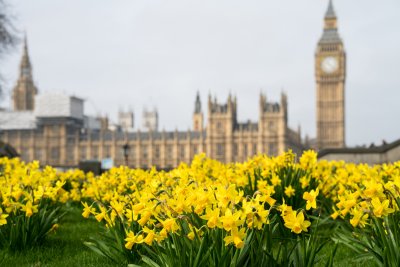New £600m incentive to improve NHS staff health
The NHS in England is step up its efforts to improve the health of its 1.4 million staff by offering financial incentives to promote physical and mental health and provide nurses, doctors and ancillary staff with healthy food options.
Simon Stevens, the Chief Executive of NHS England, said he hoped that more employers from public and private sectors would follow the health service example.
From April 2016, hospitals and other providers of NHS care will for the first time be funded to improve the support they offer to frontline health staff to stay healthy. They will be able to earn their share of a national incentive fund worth £600m in 2016/17 if they:
- offer frontline nurses, therapists, doctors, care assistants and other staff access to workplace physio, mental health support, and healthy workplace options. The annual NHS staff survey will track the increase in NHS staff saying that their trust is taking positive action to support their health and wellbeing, and reduce work related stress and back injuries.
- take action on junk food and obesity by ensuring that healthy food options are available for their staff and visitors, including those working night shifts. To qualify for the scheme, trusts will need to remove adverts, price promotions and checkout displays of sugary drinks and high fat sugar and salt food from their NHS premises. They will also be required to submit information on their current fast food franchises, vending machines and retail outlets in preparation for the NHS 'sugar tax'.
- increase the uptake of the winter flu vaccine for their staff so as to reduce sickness absence and protect vulnerable patients from infection. The aim is to increase staff vaccination rates from around 50 per cent to nearer to 75 per cent.
Estimates from Public Health England put the cost to the NHS of staff absence due to poor health at £2.4bn a year – around £1 in every £40 of the total budget. Almost 25% of adults in England are obese, with significant numbers also being overweight. Treating obesity and its consequences alone costs the NHS an estimated £5.1bn every year.
Simon Stevens, Chief Executive of NHS England, says: “As the largest employer in Europe, the NHS needs to practice what it preaches by offering better support for the health and wellbeing of our own 1.3 million staff. A good place to start is by tackling the sources of staff sickness absence including mental health and musculoskeletal injuries, while doing our bit to end the nation's obesity epidemic by ditching junk food and sugary drinks in place of tasty, healthy and affordable alternatives."
“If we can do this well, we hope that more parts of the public and private sector will see the sense of it and also take the plunge.”
A key part of improving health and wellbeing for staff is giving them the opportunity to access schemes that promote physical activity, provide them with mental health support and rapid access to physiotherapy where required. Under this new programme, hospitals, ambulance trusts, community and mental health providers and others will be funded to support them:
- Introducing a range of physical activity schemes for staff. Providers would be expected to offer physical activity schemes with an emphasis on promoting active travel, building physical activity into working hours and reducing sedentary behaviour. They could also introduce physical activity sessions for staff which could include a range of physical activities such as; team sports, fitness classes, running clubs and team challenges.
- Improving access to physiotherapy services for staff. A fast track physiotherapy service for staff suffering from musculoskeletal (MSK) issues to ensure staff who are referred via GPs or Occupational Therapists can access it in a timely manner without delay; and
- Introducing a range of mental health initiatives for staff. Providers would be expected to offer support to staff such as, but not restricted to; stress management courses, line management training, mindfulness courses, counselling services including sleep counselling and mental health first aid training.
Notes to editors
- Estimates from Public Health England put the cost to the NHS of staff absence due to poor health at £2.4bn a year – around £1 in every £40 of the total budget. This figure excludes the cost of agency staff to fill in gaps, as well as the cost of treatment. As well as the economic benefits that could be achieved, evidence from the staff survey and elsewhere shows that improving staff health and wellbeing will lead to higher staff engagement, better staff retention and better clinical outcomes for patients.
- 37% of staff report in the 2015 NHS Staff Survey that they have felt unwell as a result of work related stress in the past 12 months – down from 39% in 2014. 25% of staff report experiencing musculoskeletal as a result of work activities; however, this rises to 42% in ambulance trusts.
- The Five Year Forward View made a commitment ‘to ensure the NHS as an employer sets a national example in the support it offers its own staff to stay healthy’. This CQUIN builds on this promise and the developments made across England during the past year through some of the work being undertaken within NHS England’s Healthy Workforce Programme to help promote health and wellbeing for NHS staff and improve the support that is available for them in order for them to remain healthy & well.
- PHE’s report “Sugar reduction – The evidence for action” published in October 2015 outlined the clear evidence behind focussing on improving the quality of food on offer across the country. Under the new CQUIN scheme, NHS employers will be expected achieve a step-change in the health of the food and drink offered on their NHS premises in 2016/17, including the removal of price promotions, adverts, and checkout sales of sugary drinks and foods high in fat, sugar and salt (HFSS). They will also have to ensure that healthy options are available at any point including for those staff working night shifts. In many cases trusts will be able to achieve these objectives by renegotiating or adjusting existing contracts, or by changing specifications as new contracts are let.
- Trusts will also submit national data collection returns by July detailing their contracts with food and drink suppliers. This will include restaurants, cafés, shops, food trolleys and vending machines or any other outlet that serves food and drink. This will be used to shape the design of the new NHS 'sugar tax' expected from April 2017, alongside other approaches to reducing the sale of unhealthy products on NHS premises.
- Frontline healthcare workers are more likely to be exposed to the influenza virus, particularly during winter months when some of their patients will be infected. It has been estimated that up to one in four healthcare workers may become infected with influenza during a mild influenza season- a much higher incidence than expected in the general population. Influenza is also a highly transmissible infection. The patient population found in hospital is much more vulnerable to severe effects. Healthcare workers may transmit illness to patients even if they are mildly infected. healthcare workers directly involved in patient care are recommended to be vaccinated annually.
Published Saturday 5 March 2016
Better Hospital Food: The campaign represents a coalition of organisations calling on the Westminster government to introduce mandatory nutritional, environmental and ethical standards for food served to patients in NHS hospitals in England.





